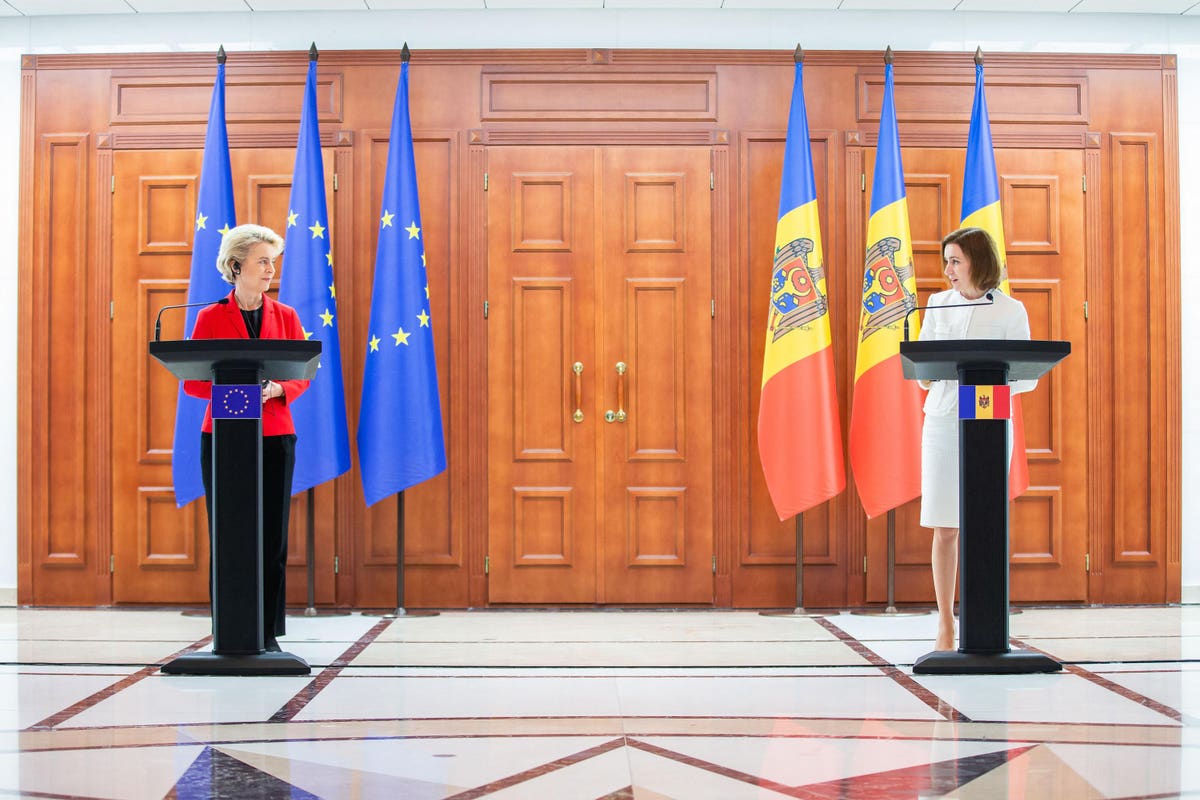Moldova is on the south-western border of Ukraine and already has a territorial dispute with Russia in a secessionist Transnistria, the breakaway region – a Moscow-backed separatist republic which borders Ukraine. Moscow supports the separatists since 1991. Now Moldovan government is warning that it is next on Russia’s hit list, and the news is making the rounds. And is increasingly sounding desperate.
“Russia’s ruthless and senseless war against Ukraine is supposed to make us, and other countries, crack under the pressure. We won’t,” said the country’s president Maia Sandu in The Economist magazine on May 10.
The new government, led by Prime Minister Dorin Recean, has vowed to pursue a pro-European path and also called for the demilitarization of Transnistria.
Chișinău, the capital city, might think joining the EU will save them (talks for ascension are scheduled for this year). The country has been in trouble for decades. Corruption and brain drain are rampant. Adding Russian strife to the mix might be dangerous for the country’s mere survival. The question is whether the President and her Cabinet are up to the task. .
“Sandu and her Party of Action and Solidarity (PAS) are involved completely in the Western geopolitics of the region; they just copy and paste the West’s rhetoric,” says Valeriu Ostalep, former diplomat and ex-Deputy Minister of Foreign Affairs and European Integration for Moldova (2005-2009). “It would not be a problem (to take) a position like that, but Sandu and PAS have lost the connection to the real problems of Moldova and the population. They are concentrated exclusively on the ‘fight against Russia’,” Ostalep says. “So we have total support by the West for Sandu and PAS and a complete disaster in the realities on the ground in Moldova, including the growing disdain of the population against Sandu and PAS.”
Moldova: Warnings About Russia Keep West Invested
In February, the White House put out a one paragraph note about President Biden’s meeting with Sandu during a trip to Poland. Moldova’s economic woes caused by border closures with Ukraine was one key issue mentioned by the President. Russia, at the time, was calling relations with Moldova “very tense”, according to a Reuters report on the matter.
The U.S. has been active in Moldova via the U.S. Agency for International Development (USAID) programs. USAID director Samantha Power said in April 2022 that Washington’s relationship with Moldova is “stronger than it has ever been. The United States will continue to stand by the people of this great country to meet the immediate needs that stem from this horrific manmade crisis,” she said, referring to the Russian war with Ukraine. “We will also remain focused on the long-term success of this country,” she said, adding that she supported Moldova’s integration with the West.
Russia meddling makes Moldova’s security important for Europe’s south-eastern flank .
“Moldova has always been on a low boil internally and despite best efforts, it never received the real attention it needed until the Russian imbroglio,” says Theodore Karasik, Fellow at the Jamestown Foundation in Washington.
In March, the New York Times wrote about Sandu trying to “thwart Russian influence.”
On May 9, Moldova’s presidential press office said that Sandu and her team will work with the EU to go ahead and press charges against Russia for war crimes. Sandu participated online at the Summit of the Core Group on the establishment of the Special Tribunal for crimes of Russian aggression in Ukraine.
In her address, Sandu said that Russia’s “war crimes and crimes against humanity will not go unpunished.”
All of this has been a gateway to open Moldova up to European and U.S. attention.
On May 10, The Hill published an op-ed by Stephen Blank, a senior fellow at the Foreign Policy Research Institute, talking about the same thing. He said, “It is equally likely that plans and strategies exist for subverting and destabilizing Balkan states (like) Moldova.” The country was the target of a supposed coup this month, according to Sandu, going off intelligence she reportedly received from Volodymyr Zelensky, Ukraine’s president. Setting up a Russian beachhead west of Ukraine made sense, though Russia denies this and says it is just there to protect ethnic Russians.
On May 11, Thomas De Waal, a senior fellow with Carnegie Europe specializing in Eastern Europe and the Caucasus region, said the real problem is poverty and economic duress, not really the Russians.
“Moldova is not Ukraine and the Russian threat is more indirect,” he wrote on May 11 on Carnegie Europe’s website. “It cannot be stated often enough that Transnistria, the mainly Russian-speaking territory which has been de facto separate from the rest of Moldova since 1992, is not Donbas (in East Ukraine). Moscow is much less invested there. On paper there are 1,500 Russian troops on the ground, but most experts agree that most of them are locals in Russian uniforms and the number of actual Russian officers who remain is less than 100. It is not an invading force,” he said. “The dangers are of a different kind.”
Moldova’s presidential press office was contacted on Friday, May 12 and again on Monday, May 15. They did not return requests for comment.
Moldova’s Failing Economy
In the 2021 parliamentary elections, Sandu’s PAS party secured a majority in the Moldovan Parliament in a landslide victory. Despite high expectations from citizens and ambitious promises, Sandu’s administration has been unable to implement long overdue economic reforms.
The lack of competence inside the Moldovan government in efficiently tackling the economic crisis has led to widespread criticism from across society, resulting in the resignation of Prime Minister Natalia Gavrilița in February 2023 and the reshuffling of the cabinet.
Despite receiving substantial support from the West, Sandu’s government has failed to carry out any significant reforms and has been in a crisis management mode for the last two years. This is particularly concerning given the record-breaking inflation of 35% in Moldova, which surpassed even that of Ukraine in 2022.
The government’s controversial splurging on luxury cars for high government employees, has further reduced its popularity and also leaves a gap for Russia to derail Moldova’s progress.
Ostalep said Sandu’s win led to her gaining absolute power in the country, adding that “the main message of her campaign was to improve the well-being of the poorest country in Europe. However, Moldova has heavily relied on unprecedented financial assistance from the West to address its snowballing problems, largely stemming from the impact of the war in Ukraine.”
Moldova has experienced a significant drop in GDP, with a decline of more than 10% in the third quarter and again in the fourth quarter of 2022, according to Trading Economics.
Russia’s thorn in Moldova’s side has undoubtedly taken up a lot of the government’s time, and that has impeded them from focusing on new economic policies. However, the lack of a coherent economic policy and the mismanagement of Western aid has resulted in disillusionment among citizens and helped the Kremlin to spread anti-Western messaging there.
Similar patterns emerged in Moldova under the pro-European government of Vlad Filat (2009-2013), which was initially hailed as a “success story” by Western leaders. However, the government was later dismissed due to grand corruption scandals, and Prime Minister Filat was imprisoned.
Investigative journalist Natalia Morari tells me that the Moldova situation today is “a story of both cruelty and incompetence. The adults are not in charge.” Morari is Moldovan. She was once expelled from Russia for her reporting on corruption and is a persona non-grata there. Moldova’s government has also gone after her for calling for protests, but nothing reportedly became of those charges against her back in the earlier days of her career in 2009.
Morari said Moldova had initially stayed neutral on the Russian sanctions introduced by the U.S. and Europe, even though they tossed around the idea of anti-Ukrainian sanctions targeting agriculture imports. Ukraine’s blockage of Moldovan ag exports was a problem for many countries and would have likely been one for Moldova as well.
Moldova’s pro-Western government is losing popularity which undermines the credibility of Moldova’s push to join the EU. Ordinary citizens are drawing parallels between Sandu’s government and Filat’s, while pro-Kremlin forces are taking advantage of the disillusionment. This is especially true in the semi-autonomous region of Gagauzia where voters elected two candidates this month with a pro-Russian agenda. On May 14 Evgenia Gutul from the pro-Russian Shor Party came in first in the regional elections, opening the door for further destabilization of the country.
Sandu has that Western world elite pedigree. For Moldovans who are intrigued by American CV’s, she is impressive on paper. She is a 2010 graduate of the Harvard Kennedy School of Government. She is an ex-World Bank advisor to the Executive Director. But she cannot do it alone. There are no Sandu stunt doubles roaming around Moldova to push for comprehensive reform, including de-regulation and systemic anti-corruption measures that include government officials too closely wedded to oligarchs.
Generously funded pro-European governments in post-Soviet states, like Moldova and Ukraine, risk eroding their own credibility through corruption and lackluster upward mobility for the less fortunate. This is Moldova’s biggest problem, as the government will be facing rejection from their voters, undermining pro-Western policies and giving Russia an in, something the West surely abhors.
Should the economy continue to suffer, with no end in sight to the Ukraine war, “The question will become ‘how legitimate is this PAS government? Who’s interests do they represent? Brussels and London? Washington? That’s ok, but it has nothing to do with the real people of Moldova,” says Ostalep. As it stands, PAS mostly enjoys support in and around the capital city of Chisnau. Beyond that, they have lost the support of the masses. “This is a real problem.”
Read the full article here













